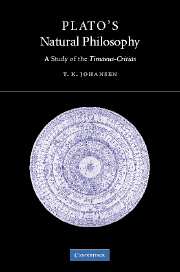Book contents
- Frontmatter
- Contents
- Acknowledgements
- Introduction: Plato's tales of teleology
- 1 What is the Timaeus-Critias about?
- 2 The status of the Atlantis story
- 3 The status of Timaeus' account
- 4 Teleology and craftsmanship
- 5 Necessity and teleology
- 6 Space and motion
- 7 Body, soul, and tripartition
- 8 Perception and cosmology
- 9 Dialogue and dialectic
- Epilogue
- Bibliography
- General index
- Index locorum
Epilogue
Published online by Cambridge University Press: 03 September 2009
- Frontmatter
- Contents
- Acknowledgements
- Introduction: Plato's tales of teleology
- 1 What is the Timaeus-Critias about?
- 2 The status of the Atlantis story
- 3 The status of Timaeus' account
- 4 Teleology and craftsmanship
- 5 Necessity and teleology
- 6 Space and motion
- 7 Body, soul, and tripartition
- 8 Perception and cosmology
- 9 Dialogue and dialectic
- Epilogue
- Bibliography
- General index
- Index locorum
Summary
At the beginning of the Timaeus-Critias Socrates likened himself to a spectator wishing to observe beautiful animals in motion. At the end of the work the world and its denizens have been shown to be just that. The cosmos itself is a beautiful animal moving in time and space and it is composed of animals, planets, humans, and other animals, whose design displays the greatest possible rationality. Even the city and its actions can be understood by its place within the greater cosmic order. As readers we are placed in the position of observers of a cosmos which, like that famously presented on the shield of Achilles in Iliad 18 and reconstructed on the cover of this book, invites us to understand our role as human beings and citizens by inclusion in a world order. If this is the world we live in, if this is how nature works, then we should arrange our lives accordingly. The Timaeus-Critias coaxes us into adopting an ordered life, not by knockdown argument, but by showing our place in a picture. It is the detail and completeness of this picture that draw us in. Cosmology plays an important role here particularly for those of us who have not been brought up in a well-ordered city and who therefore lack first-hand experience of paradigms of good order.
- Type
- Chapter
- Information
- Plato's Natural PhilosophyA Study of the Timaeus-Critias, pp. 198 - 200Publisher: Cambridge University PressPrint publication year: 2004



